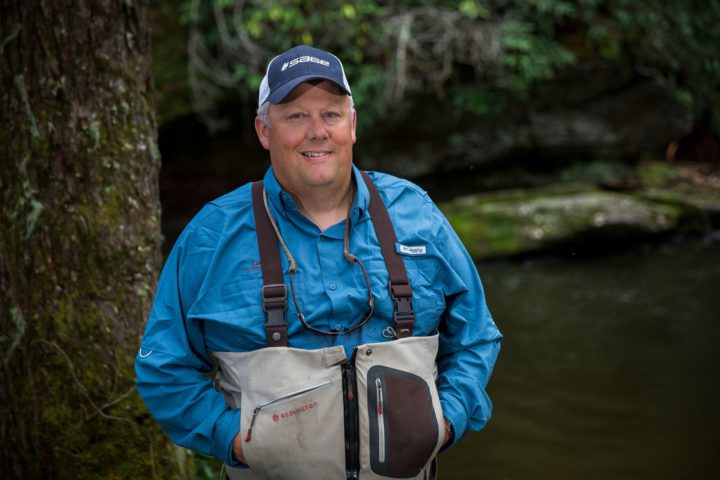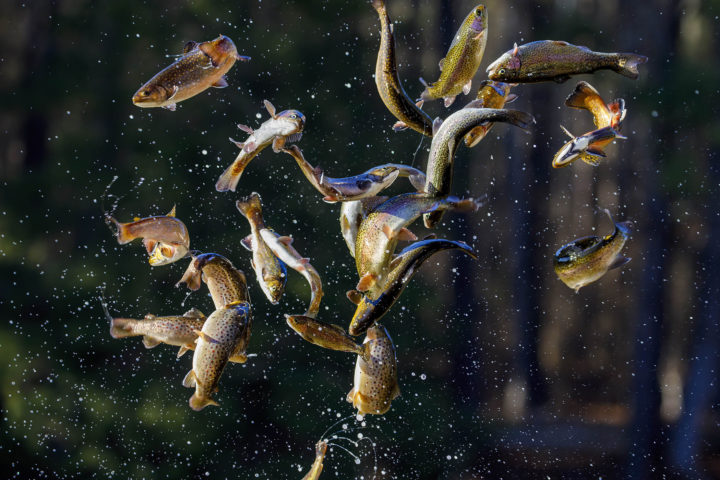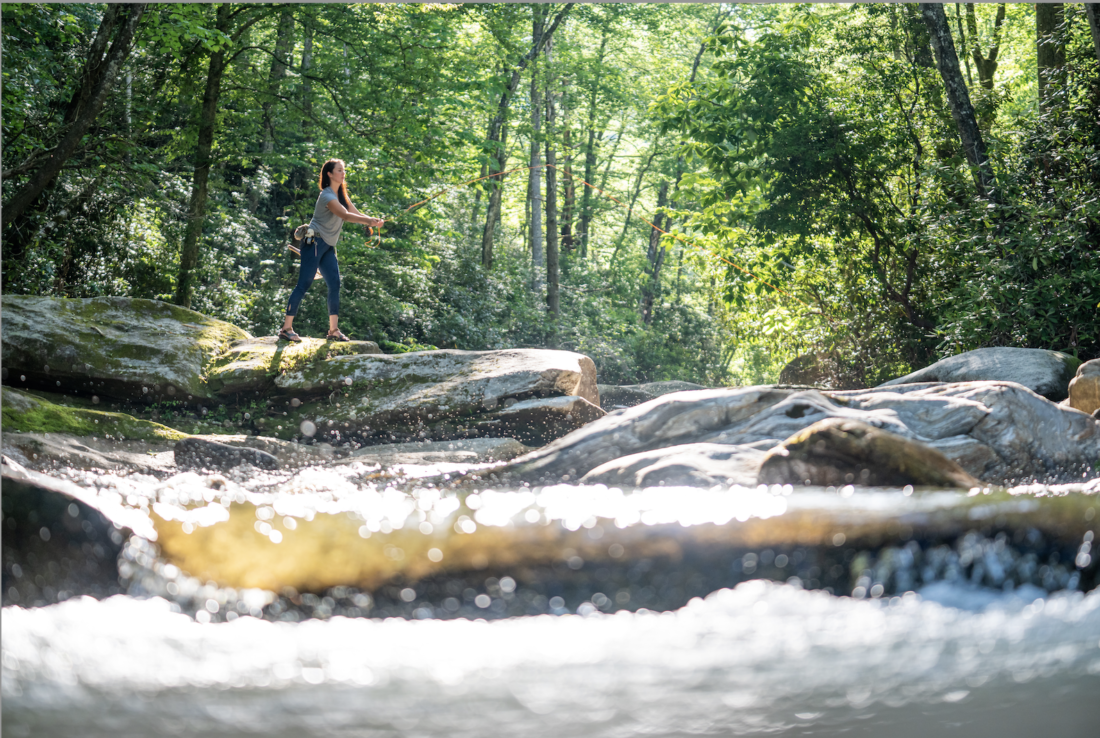Western North Carolina tourism officials are concerned that renovations to a local trout hatchery could send the fishing-related tourism industry off a ledge.
Fishing is deep-rooted in the mountains, and it’s grown into an economic juggernaut in recent years, supporting lodging, groceries, restaurants, guides and equipment rentals. A 2015 report by the N.C. Wildlife Resources Commission (NCWRC) found anglers in the mountain region spent $210.7 million in 2014, added $334.3 million to the economy and supported 3,200 jobs.
Just eight years later, that figure quadrupled. A 2023 report by NCWRC showed an overall impact on the state’s economy of $1.38 billion, and it estimated the trout industry supported nearly 12,000 full- and part-time jobs.
Much of the industry can be traced to the tanks and pools at the largest trout hatchery in North Carolina: the Bobby N. Setzer Fish Hatchery. Located near Brevard in Pisgah National Forest, the Setzer hatchery produces 75% of the stocked trout in public waters in Western North Carolina.
However, a renovation expected to begin next year at the 67-year-old facility will diminish upcoming stockings by two-thirds. “We’re looking at probably being able to stock about 35% of what we normally would,” says NCWRC fish production supervisor David Deaton. According to the NCWRC website, trout stock will be reduced in 2025 and 2026, and potentially in 2027. The commission anticipates by 2029 the hatchery will be producing more trout than it does now.
What effect the Setzer hatchery renovation will have on businesses relying on trout fishing is “kind of hard to say,” says Deaton. All the locations NCWRC supplies will continue to be stocked, but with fewer fish and less often, he says. NCWRC’s website notes reductions will be shared equally among the locations.
These smaller numbers have some in local business and tourism industries coming together to voice their shared concerns to state representatives about the impact of these renovations.
Big fish
The Setzer hatchery, located alongside Davidson River, is one of three coldwater hatcheries in the region; the other two are in Marion. Most of North Carolina’s rivers are too warm much of the year for trout to survive. NCWRC, which regulates trout fishing and leases the hatchery, opened 32 trout streams and two lakes to fishing on June 1.
Setzer has a hatchery, an education building and 54 outdoor ponds called raceways. The hatchery building operates as a piscine (fish) nursery, where eggs hatch and “fry” grow in tanks. When the trout become “fingerlings” (about the size of a finger), they are moved outdoors into the 8-by-100-foot raceways. When trout reach about 10 inches, they are transported to streams and rivers in 15 counties across WNC. The Setzer hatchery is at maximum capacity for the number of fish it can rear and stock, according to Deaton. He estimates 1.2 million trout were being raised in the hatchery on the day he spoke to Xpress.
Despite its output, the facility’s age is showing. It was built in 1957 and updated in the 1990s. “The concrete is so brittle that I can literally take my finger and flick the concrete off the walls,” says Kevin Howell, owner of Davidson River Outfitters in Pisgah Forest.

Deaton concurs: “The infrastructure itself is falling apart. The concrete for the raceways where the trout is kept [is] starting to crack and leak.”
Discussions about a renovation began in 2017, Deaton says, and project planning began in 2022, the year after Tropical Storm Fred swamped the hatchery, filling raceways with sediment and debris and flushing fish into the parking lot. The hatchery lost two-thirds of its trout stock during the storm, which also damaged the property’s education center. The hatchery returned to operation a couple of weeks after Fred, Deaton says. But the storm underscored the facility’s vulnerability to flooding. After Fred, Deaton says, engineers used high-water marks on the hatchery’s buildings to determine the height of its new builds. Additionally, the renovation will add a perimeter wall.
Renovation plans for the Setzer hatchery were outlined by ranger David Casey of the National Forests in North Carolina Pisgah Ranger District. The redesign will more efficiently use water, upgrade water piping and improve the oxygenation system, Casey wrote. The hatchery building will be demolished and rebuilt, and the education building and restroom facility will be expanded. Raceways will be reconfigured into a layout that will maximize trout production.
The renovation could increase trout production by an additional 75,000 pounds per year, Casey’s letter says.
Deaton says the hatchery will add 10 more raceways, but the increased production capacity will primarily result from more efficient oxygenation, he explains.
‘Substantial losses’?
Last month, the executive directors of five tourism organizations in Western North Carolina contacted state legislators expressing concern about the renovation’s potential impact on local businesses.
On May 28, representatives of the five groups — Jackson County Tourism Executive Director Nick Breedlove; Swain County Tourism Executive Director Sarah Conley; Transylvania County Tourism Executive Director Clark Lovelace; Visit Highlands Executive Director Kaye McHan; and Haywood County Tourism executive director Corrina Ruffieux — sent letters to state Sens. Kevin Corbin and Ralph Hise and Reps. Mike Clampitt and Mark Pless.
“The current plan to reduce trout stocking by such a large margin will inevitably result in substantial revenue and employment losses across multiple counties,” the executive directors wrote. “Local businesses, including guide services, outfitters, tackle shops, restaurants, gas stations and lodging establishments, will suffer as anglers seek other destinations with healthier fish populations, and we risk losing them permanently.”
The letter continues, “We urge you to address this issue at the state level and explore potential solutions to mitigate the economic impact on Western North Carolina.”
Pless: ‘Not concerned’
Frank Yaun, an Asheville-based fishing guide, worries WNC will lose mountain trout tourism due to the Setzer hatchery renovation. He also worries that tourists and poachers (those who take more than the permitted amount of fish at one time) will vie for the same, smaller stocked population. He thinks scarcity, or the fear of scarcity, could increase the desperation of poachers to catch the stocked trout before recreational anglers have a chance.
“People are going to go ‘Why are we going? There’s no fish in North Carolina,’” Yaun says. “And by the time they get that hatchery repaired, it’s going to be too late. The people aren’t going to come back. So that’s our concern — there’s a lot of fly shops that are going to go out of business.”
However, Yaun’s concerns aren’t shared by all local fishing guides. Howell, owner of Davidson River Outfitters in Pisgah Forest, predicts that the Setzer renovation will cause a couple of years when anglers will have to be content with catches that aren’t as robust.
Fishing in hatchery-supported waters allows for a catch of seven trout per day; anglers in wild trout waters are permitted four catches per day. Both Howell and Yaun say their customers are all catch-and-release. Howell doesn’t think they’ll abandon mountain trout fishing entirely. “Sure, it may be a little bit of a dip,” Howell says. “But I don’t think it’s going to be doom and gloom. I don’t think it’s going to be the end of the world or the end to tourism.”
An FAQ section about the Setzer renovation on the NCWRC website states “Trout fishing in stocked waters is still encouraged, but we ask that anglers be aware that the number of trout to be caught will be reduced,. The site notes wild trout waters are an option for fishing as well.

Rep. Pless, whose district includes Haywood and Madison counties, told Xpress in an email he is “not concerned there will be an impact” on tourism businesses. He cited a 2022 study from Transylvania County’s Tourism Development Authority that states 10% of visitors went fishing and 3% of visitors reported fishing was their motivation for traveling to Transylvania County. The study shows other activities, like visiting waterfalls and shopping, attract more visitors.
Pless also criticized the local trout fishing business model. “I have learned that trout outfitters are selling classes and guided tours to folks, which is depleting the stocked fish as soon as they are put in the stream,” he wrote Xpress in an email. “As a member of the Wildlife [Resources] Committee I will be digger [sic] deeper into this and we may need to implement restrictions for commercial trout fishing much like the coastal waterways. NC Wildlife maintains the fish stocking program for residents and visitors, not for subsidizing private or cooperate [sic] business to take advantage of.”
Xpress also reached out to Corbin, Hise and Clampitt, the other state legislators contacted by local tourism executives, for comment. None responded.
Buying private
The NCWRC website says the Armstrong State Fish Hatchery in Marion “will provide most of the trout stocked” when Setzer’s output is decreased.
In their letter, the regional tourism authorities suggested another way to address the decrease in trout stock.
“One proposed solution is to secure alternative trout suppliers and apply for permits to restock the rivers independently,” the letter says. (NCWRC issues a permit to entities other than state agencies that wish to stock public waters.) “We would also seek any other proactive approaches you can assist with from a state level that will help sustain our local economy and preserve the livelihoods of those dependent on the fly-fishing industry.”
That approach is on NCWRC’s radar. “One of the things that we’re going to try to [do to] lessen that effect on anglers is looking at getting fish from the private sector,” Deaton tells Xpress.
But private hatcheries are smaller than Setzer and may not be able to scale their production to meet the need, Deaton continues. Additionally, private hatchers already have commitments to existing customers, especially the local restaurant and grocery industry. “Most of their fish are already allocated to other customers,” Deaton says. “It’s kind of hard for them to drop an existing customer to sell us a large quantity of fish.”
Still, some private producers will have trout available, which NCWRC hopes will augment supply, Deaton says. “I have been discussing that with a few growers already,” he tells Xpress, citing “three or four” larger private trout producers. “What we’re looking at doing is trying to see what extra fish they have available or can make available for us. Then what we would do [is] purchase those fish and try to supplement some of the stockings that we have planned so that the numbers aren’t as low as they are.”
NCWRC purchased trout from private producers following Tropical Storm Fred in 2021.“I was able to work with a few other states and some private producers to purchase fish and … eggs so that there were not any impacts to the following year with the [trout] numbers,” Deaton says.

However, Yaun is concerned that private production purchases by NCWRC won’t replenish the full 67% reduction due to the price tag. “Because they don’t want to spend the money,” Yaun predicts.
Deaton says that he is in discussions with private producers. “The cost of buying everything we need would be significant,” Deaton says, explaining that he doesn’t yet have a budget set. However, he notes that the facility will have money available from its operations budget during the renovation. For example, Deaton says he typically spends $1 million a year on fish food; that expense will reduce when the hatchery’s output decreases. He also notes that the Wildlife Commission’s Wildlife endowment fund could contribute.
Deaton estimates construction on the Setzer hatchery may begin in winter. Currently, the renovation is still in the permitting process, he says.




I would think an elected official in Haywood & Transylvania Counties would understand the economic impact mountain trout fishing has on his area, AND would have his facts straight when being quoted in the paper. Mr Pless, there’s a program called Delayed Harvest that NCWRC started in the early 90’s, which they stock Delayed Harvest designated streams monthly from October thru May, and during that time period, the law is NO fish are to be harvested. I know of no fly fishing guides that condone keeping trout, ESPECIALLY when it’s illegal, it simply doesn’t happen. We’ve had a significant poaching problem the last few years, that have significantly depleted trout populations, the the fly fishing industry has been very vocal about NCWRC getting this problem mitigated, to no avail. WNC streams have granite substrate, which basically causes streams to be too acidic for good trout growth, as well as not conducive to aquatic insect life, so we’re VERY dependent on the stocking program, which according to NCWRC, has a 1.38 BILLION dollar economic impact on the WNC economy. We’ve already seen a substantial decrease in guide trips due to depleted trout populations due to poaching, at the full stocking levels, what do you think will happen when there’s a 67-80% stocking reduction, coupled with the poaching issue? Ask the state of Georgia when they had a similar issue, their fly fishing industry took a beating. Sure, Mr Pless can cite some obscure country study that fishing has a negligible impact on the WNC economy, but the NCWRC says mountain trout fishing has a 1.38 BILLION dollar impact on the WNC economy, that’s hardly small potatoes, it’s really not that complicated. The fish are available thru private hatcheries, but it’s flat out a budget issue, the state doesn’t want to spend the money, i was told that by a high ranking NCWRC official, and i believe 2 NCWRC representatives admitted that in a Maggie Valley town hall meeting. NCWRC should not put a 1.38 BILLION dollar economic impact at risk, there are so many jobs and small business that will very likely go away, we don’t have the luxury in WNC to gamble with that big of an economic impact.
Frank Yaun
Asheville, NC
I would also like to note that some outfitters primarily fish private water, which means they either own the land around a stream, or lease the land, controlling access to the stream, They stock these waters heavily using private hatcheries, and charge a pretty penny to fish the waters, with their guides. So sure, they’re not as worried as other outfitters that guide on public access waters, they have access to water the general public does not, so the proposed stocking reduction will likely push MORE business their way, while greatly reducing the general publics access to streams with decent trout populations.
So typical of tourism fools to be greedy and short-sighted, not to want to invest in long-term sustainability and infrastructure…
God forbid anyone upsets the lousy tourist industry. The pox on them…get them out of Asheville.